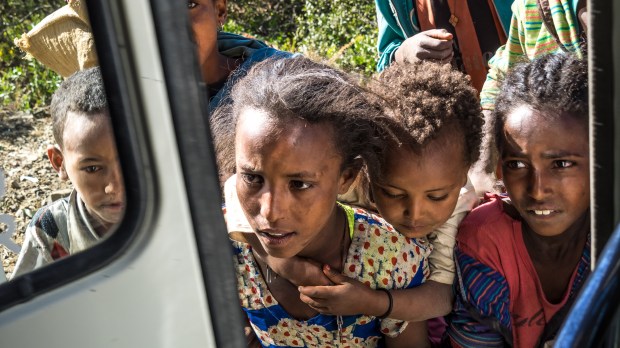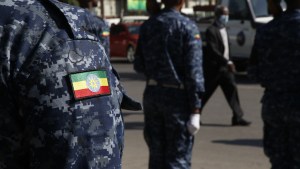Lenten Campaign 2025
This content is free of charge, as are all our articles.
Support us with a donation that is tax-deductible and enable us to continue to reach millions of readers.
Catholic Relief Services in Ethiopia welcomed news of a government-declared truce in its almost 17-month fight against rebels in a northern region of the country to allow humanitarian aid to reach starving Tigrayans. The U.S.-based Catholic aid agency says it is ready to start delivering humanitarian aid as soon as roads are opened.
“CRS welcomes the announcement from both the government side and the TPLF [Tigrayan People’s Liberation Front] side,” said Zemede Zewdie, country representative for CRS in Addis Ababa. “It’s very good news. As soon as the road access is opened, CRS is ready to transport food commodities, water, repair kits, shelter and other humanitarian supplies. We’re ready. As soon as they open up, we can immediately move and provide support for needy people.”
Zewdie said he is communicating with staff in Tigray and CRS partners who have a presence in different parts of the region to prepare storage facilities and other logistics for delivering the aid. He said he is hopeful that the corridor will open “in the coming days or weeks,” as the shortage of food is “critical.”
Ethiopians have been dealing with two crises in recent years, a drought and a civil war. In November 2020, a military conflict erupted between forces aligned with the TPLF and Ethiopia’s national military, the Ethiopian National Defense Force. The conflict has exacerbated ethnic violence and has largely centered in Tigray, Amhara, and Afar regional states.
Zewdie said that the conflict and the drought have displaced a large number of people from their homes and made them dependent on humanitarian aid.
“One of the big challenges has been the death of livestock in the lowland part of the country. A lot of cattle died because of the drought,” he said in an interview Tuesday. “That is the major livelihood of the pastoralist community. Recovering that asset will take some time.”
The conflict in Tigray has interrupted schooling and has been a source of trauma for children, he said, adding, “This will have long term implications.”
Ukraine war’s effects
In January, the World Food Programme said that 83% of the population surveyed in the Tigray Region – 4.6 million people – are “food insecure,” of which 2 million are severely food insecure.
The conflict in Tigray, like others in other parts of Africa, have received nowhere near the attention of international media as Russia’s invasion of Ukraine has. Recently, Pope Francis, who has been very outspoken in calls for peace in Ukraine, asked listeners not to forget other world hotspots where people are suffering, such as Yemen, Syria and Ethiopia.
But one aspect of the war in Eastern Europe has certainly helped to bring attention to those hotspots. Because Ukraine and Russia are major exporters of grain and other commodities, the war’s effects are being felt in places like Ethiopia. Sanctions against Russia have severely impacted its ability to export grain. And it has blocked the Black Sea, so Ukraine cannot export by ship. It also lacks enough rail cars to do so overland.
This year’s harvest is also a concern. With fuel and other supplies being diverted to the military, Ukrainian farmers are unlikely to be able to plant this spring. Even if wheat comes from other sources, the cost of shipping has increased due to higher oil prices, another result of the war in Ukraine.
Zewdie said CRS is preparing to assess how all this will have an effect on starving Ethiopians.
“The government is importing more than half a million dollars worth of wheat grain from Ukraine each year to supplement the food requirement of the country,” he said. “Now the increase in the price of both wheat and oil will definitely have a significant impact in terms of the number of people who can be reached with that food.”
CRS, however, imports food from the US to help feed Ethiopians, but the “global increase in the price will definitely affect the number of people we’re able to reach or the cost of reaching people affected by the drought and the conflict,” Zewdie said.
In the meantime, although access to Tigray has been limited, CRS has been able to supply “minimum support,” he said. Working through partners on the ground, that includes providing shelter material and cash for people to rehabilitate their households; repairing damaged water systems; providing “psycho-social support,” and sending nutritious food on UN cargo flights.
In the South of the country, CRS has been facilitating daily truck deliveries of water, both for livestock and for displaced people, and initiating well projects. “We’re also delivering fodder for livestock,” he said.
And, in a positive sign, rains have begun to reappear in some areas, and CRS is providing seed for people there to, hopefully, plant for a fruitful growing season.



